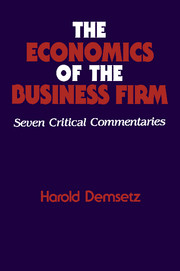Book contents
- Frontmatter
- Contents
- Preface
- First commentary: The firm of theory: its definition and existence
- Second commentary: Agency and nonagency explanations of the firm's organization
- Third commentary: Enterprise control, wealth, and economic development
- Fourth commentary: Profit maximization and rational behavior
- Fifth commentary: The use and abuse of accounting profit data
- Sixth commentary: Management compensation and tournament theory
- Seventh commentary: The intensity and dimensionality of competition
- References
- Index
Sixth commentary: Management compensation and tournament theory
Published online by Cambridge University Press: 06 July 2010
- Frontmatter
- Contents
- Preface
- First commentary: The firm of theory: its definition and existence
- Second commentary: Agency and nonagency explanations of the firm's organization
- Third commentary: Enterprise control, wealth, and economic development
- Fourth commentary: Profit maximization and rational behavior
- Fifth commentary: The use and abuse of accounting profit data
- Sixth commentary: Management compensation and tournament theory
- Seventh commentary: The intensity and dimensionality of competition
- References
- Index
Summary
It is my purpose here to join the current debate about management compensation, giving special emphasis to the tournament theory explanation of high CEO compensation. Except for work on tournament compensation theory, most current studies of management compensation set aside questions about the level of CEO compensation. They consider instead questions about the sensitivity of CEO compensation to firm performance [Lewellen (1971); Jensen and Murphy (1990); Murdoch (1991)]. Their technique, consequently, has been to investigate the statistical association between changes in firm equity value and changes in CEO compensation, using the former as a measure of CEO productivity. The present study examines the level of CEO compensation and the structure of compensation within the management hierarchy, but a few words may be said about the sensitivity of CEO compensation to firm performance.
Some issues related to the sensitivity of management compensation to firm performance
The discussion to this point should have revealed just how difficult it is to measure productivity. Certainly, firm performance is an important aspect of this measurement insofar as top management productivity is concerned, but gross oversimplifying is involved in studies that take stock price measures of performance so seriously as the sole arbiter of CEO productivity. The working assumption used by the more important of these studies is that a dollar change in performance should translate to a dollar change in CEO compensation if proper incentives are to prevail. The assumption strains credulity. Interdependence between the productivities of team members, including leading shareholders and members of the board, argues against a dollar-for-dollar translation. But beyond these considerations is another.
- Type
- Chapter
- Information
- The Economics of the Business FirmSeven Critical Commentaries, pp. 110 - 136Publisher: Cambridge University PressPrint publication year: 1995
- 2
- Cited by



